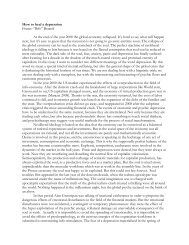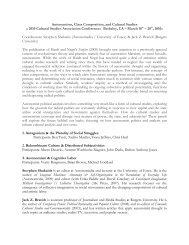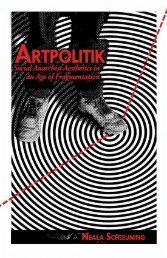nanopolitics handbook - Minor Compositions
nanopolitics handbook - Minor Compositions
nanopolitics handbook - Minor Compositions
You also want an ePaper? Increase the reach of your titles
YUMPU automatically turns print PDFs into web optimized ePapers that Google loves.
of this as the general condition which makes our self-reproduction dependenton our participation in reproducing capital and the social body: one mustsell one’s time and energy, one’s body and mind, even often invest one’s desireto get a wage or petty cash. One most take up loans if that wage is not enoughto live, the debt to the state entailed in benefits, or one must become a dependenton someone who can access wages or loans – as housewife, servant,unpaid domestic worker. 21 When wages, welfare or employment are cut, themeans of reproduction shrink, and the labour of reproduction increases: thislabour still mostly falls on women. 22But we can also speak of proletarianisation in the sense of Bernard Stiegler,who usefully theorizes it as the loss of ability to do and make [savoir-faire] andto live [savoir-vivre]. 23 To focus on merely the field of health, the process ofproletarianisation, as Silvia Federici has shown, proceeds through sustainedattacks on the practices and knowledges of reproductive health and traditionalmedicine that were mostly the remits of the women who came to be prosecuted,and killed in genocidal numbers, as witches. 24 Today similar processesare ongoing with attacks on indigenous communities around the globe, aswell as in the ongoing witch-hunts in many African countries (e.g. South Africa,Kenya, Zimbabwe 25 ). The violence of the attacks on indigenous Europeanhealers and midwives is the historical basis for the strong separation betweenhealth experts (doctors, scientists, heath practitioners) and the rest of us, aseparation which is constantly reproduced. This destruction of traditionalcommunal forms of health provision thus produced the historical conditionsunder which state and charity provision of health services became ever moreneeded, and basis for the individualising procedures of modern medicine. Tounderstand biopower and governmentality not just through the constructionof discourses of the body and the health of populations, but as the destructionof other modes of health provision forces us to read Foucault’s analysis ofmodern medicine in a different light, that of deeply gendered and racializedprocesses of and struggles against proletarianisation. 26 In the field of healththe development of popular controlled health centres, alternative medicine,self-help literature, online self-diagnosis websites, and the movements to reclaimsexual knowledge and science (e.g. Act Up) – often in conflict with theinstitutions of mainstream medicine (pharmaceutical companies, nationalheath ministries, doctors associations) – can be understood both as necessitatedby proletarianisation, and as limited processes of deproletarianisation(subject to pressures of commercialisation and professionalised, or risks ofesoteric withdrawal). At their best, initiatives of the former kind combat thepowers that attempt to sustain our individualisation and the proletarian condition,which sustain our dependence upon those powers.206










